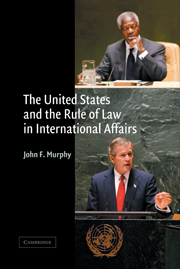Book contents
- Frontmatter
- Contents
- Acknowledgments
- Introduction
- 1 Law and legal process in international affairs
- 2 The status of international law under US law
- 3 UN dues
- 4 Use of force
- 5 Arms control, disarmament, nonproliferation, and safeguards
- 6 The law of the sea
- 7 The International Court of Justice
- 8 Prevention, prosecution, and punishment of international crimes
- 9 Human rights and international environmental issues
- 10 Summary and conclusions, and some possible future scenarios
- Index
7 - The International Court of Justice
Published online by Cambridge University Press: 22 September 2009
- Frontmatter
- Contents
- Acknowledgments
- Introduction
- 1 Law and legal process in international affairs
- 2 The status of international law under US law
- 3 UN dues
- 4 Use of force
- 5 Arms control, disarmament, nonproliferation, and safeguards
- 6 The law of the sea
- 7 The International Court of Justice
- 8 Prevention, prosecution, and punishment of international crimes
- 9 Human rights and international environmental issues
- 10 Summary and conclusions, and some possible future scenarios
- Index
Summary
Earlier in this study, we have had occasion to examine US interactions with and attitudes toward the International Court of Justice. In this chapter we seek to focus more precisely on the reasons for the present malaise.
From an historic perspective, the first movement toward the establishment of an international adjudicatory body came at the Hague Peace Conferences of 1899 and 1908. Despite enjoying the support of a number of states, however, proposals for a permanent international court came to naught. The only institution to emerge from these conferences was the Permanent Court of Arbitration (PCA, created in 1899). But the so-called permanent court is not a true judicial institution. Rather, the PCA merely provides facilities for international arbitration, including lists of available arbitrators.
After World War I, in the wake of the extensive carnage caused by that conflict, the Permanent Court of International Justice (PCIJ) came into being as the judicial organ of the League of Nations. As is well known, the United States never joined the League of Nations or ratified the Court's Statute. As a result, in the words of Rosalyn Higgins, a British national and judge of the International Court of Justice:
The United States – in a pattern of treaty participation that was to occur many times later in history, down to this very day – was a major player in the formulation of the Protocol and Statute, and then failed to endorse their terms because Senate approval was not forthcoming. Although refusing to approve the Paris Peace Treaties whose terms it had done so much to secure, a Judge of American nationality nonetheless served on the Bench of the PCIJ throughout its lifetime.
- Type
- Chapter
- Information
- The United States and the Rule of Law in International Affairs , pp. 250 - 283Publisher: Cambridge University PressPrint publication year: 2004



